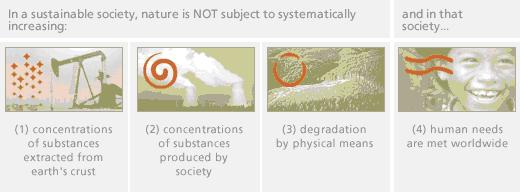The Natural Step
The Natural Step: What is It?
The Natural Step (TNS) is not a measure of scale but rather a process or program to achieve sustainable scale. It was devised by a Swedish physician, Dr. Karl Hendrik Robert, who observed that many of his paediatric patients were developing cancers with no family history of the disease. He traced the causes to environmental contaminants, which led him to further investigate the relationship between environmental issues and human health. He engaged with a number of scientists to identify the basic principles or conditions required for sustainability. In 1989 he founded TNS as a not for profit organization to apply these principles to the systemic causes of environmental problems.
TNS recognizes that the life support services provided by ecosystems are in decline at the same time as increasing demands are being placed on them by a growing global economy and population. It envisions the process of

achieving sustainability as “expanding the funnel” presently constricted by decreasing resources and increasing demands. This expansion occurs by creatively applying the core conditions for sustainability.
Conditions for Sustainability
TNS identifies four basic conditions or principles to achieve sustainability. These are:
-
substances from the earth’s crust must not accumulate in the earth’s biosphere
-
substances produced by society must not increase in the biosphere
-
nature’s functions and diversity are not systematically impoverished by physical displacement, overharvesting or other forms of ecosystem manipulation
-
resources must be used fairly and efficiently in order to meet basic human needs globally.

These conditions arise from consideration of the flows of materials from the earth, through human activities and back to the earth. It focuses on the basic science which identifies the natural balances of these flows without human interference, and the impact of human activities which upsets these balances.
TNS articulates a general rule, which states that "human activities must not cause deviations from the natural balances that are large in comparison to natural fluctuations. In particular, any deviations should not be allowed to increase systematically."
Applications of The Natural Step
TNS has been accepted as an approach to sustainability in a variety of governmental and organizational setting, including both public and private sector operations.TNS operates in several countries, including Sweden, the UK, the USA, Australia, Israel, New Zealand, South Africa, Canada and Japan. It has consulted to several municipalities and corporations, and provides a variety of publications describing its work1.
Relation to Sustainable Scale
TNS has much in common with the approach to sustainable scale from an ecological economics perspective. Both approaches acknowledge:
-
the importance of the natural sciences and focus on the impact of material throughput on ecosystem services
-
the biophysical limits of ecosystems and note how human activities upset the natural balances established through evolutionary processes
-
that upsetting the natural balances results in degradation of ecosystem services
-
that these imbalances lead to a decline in ecosystem services which provide life support services upon which human societies depend
-
that market and non-market solutions are needed to achieve sustainability
-
that social justice in terms of meeting basic human needs is essential for sustainability.
TNS provides a simplified conceptual framework and practical application of a sustainable scale perspective (A Sustainable Scale Perspective). A point of differentiation is the emphasis the two approaches place on economic activities: sustainable scale focuses on economic growth as a major driver of the imbalances between throughput demands and ecosystem limits; TNS does not explicitly focus on economic activities but certainly includes economic activities in its analysis of drivers which cause the imbalances.
TNS has been successful in attracting interest in these important issues at the level of individual cities, states, corporations and other organizations, and in demonstrating its usefulness in these settings. The pity is that larger political units such as national governments or international bodies such as the OECD or the United Nations have not explored this approach.
References
Robert, Karl-Henrik. The Natural Step Story: Seeding a Quiet Revolution. Gabriola Island, BC: New Society Publishers, 2002.
Ants, Galileo, and Gandhi: Designing the Future of Business through Nature, Genius, and Compassion, developed following The Natural Step's 2002 Conference and with chapters from key participants who together reveal that sustainability is now beginning to permeate the economic landscape.
http://www.greenleaf-publishing.com/catalogue/antstns.htm
1www.naturalstep.org